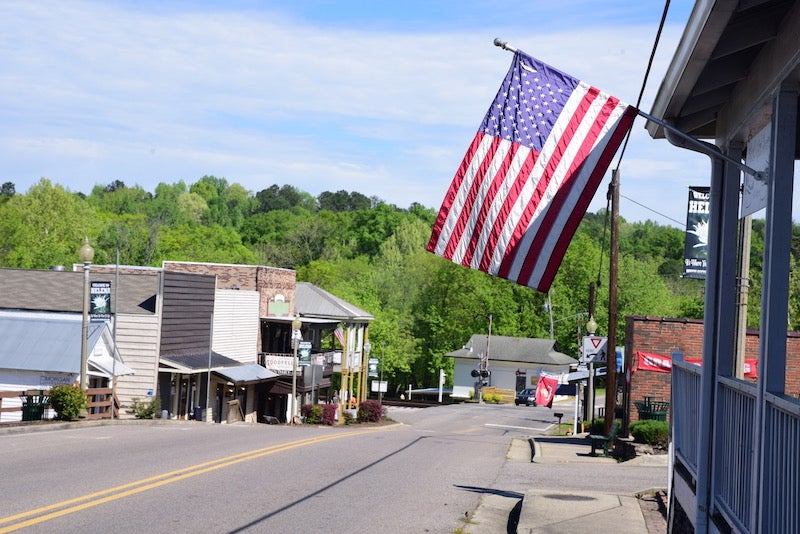Gov. Ivey issues stay-at-home order for Alabama
Published 4:23 pm Friday, April 3, 2020

- Alabama Gov. Kay Ivey issued a shelter-in-place order for the state of Alabama at a press conference on Friday afternoon, April 3. (Reporter photo/Keith McCoy)
|
Getting your Trinity Audio player ready...
|
By ALEC ETHEREDGE | Managing Editor
A week shy of a month into Alabama’s battle with COVID-19, Gov. Kay Ivey issued a stay-at-home order for the state on Friday, April 3, to try and curb the spread of the novel coronavirus.
The order will go into effect on Saturday, April 4 at 5 p.m. and will last until April 30 at 5 p.m. when it will be determined if it needs to continue.
This comes a week after the governor announced the closure of non-essential businesses across the state on Friday, March 27, as part of a “Safer-at-Home” order that included the closure of non-essential businesses until at least April 17.
But, with more than 1,400 cases statewide, including 38 reported deaths and 17 confirmed statewide and 107 confirmed cases in Shelby County, the order comes as a means of slowing and hopefully stopping the virus’ deadly trek.
“I’ve said we would keep all options on the table for how we would respond and when we would do more,” Ivey said. “Alabama is seeing an increasing number of positive tests every day. Our expected surge in hospitalization will occur in about two or three weeks and those patients are the ones that will become infected in the next few days. So folks, we need to extend our health orders now.”
Ivey said the previous attempts to flatten the curve in the state weren’t enough and “that’s why we are taking this drastic step.”
“Late yesterday afternoon, it became obvious that more has to be done,” Ivey said. “April stands to be very tough and potentially very deadly. COVID-19 is an eminent threat to our way of life and we are past urging people to stay at home, it is now the law.”
Ivey said you can still go out and get groceries and medicine, you can still order takeout food. You may also leave your house for dental, medical or surgery procedures, as well as government-funded services and automobile repair services.
You can also attend religious services if it features 10 people or less with 6 feet between everyone or if it is a drive-in service.
You can also leave your home to take care of others, work as part of an essential business, engage in outdoor activities, seek shelter, to see family or travel.
Essential businesses are as follows: Government operations, health-care providers and caregivers, infrastructure operations, manufacturing facilities, agricultural operations and farms, essential retailers to provide for your every day living like grocery stores, home improvement stores and gas stations, media operations, education operations, financial services, professional services like real estate, providers of basic necessities to economically disadvantaged populations, construction, public service, military or defense operations, essential services or product providers, religious entities, federally-designated critical infrastructure and support operations for essential businesses.
There will be changes to how essential businesses handle occupancy and social distancing.
Occupancy will be limited to 50 percent of the normal occupancy load and employees must keep patrons from congregating and for them to stay 6 feet apart.
“Basically, we need people to stay at home,” said Alabama State Health officer Dr. Scott Harris. “People are ordered to stay at home except for these essential services. Certainly we understand there are reasons people need to get out, but the default position for everyone is that they need to stay at home. We need to stay at home if at all possible. The best way to stop the transmission of this disease is to stay 6 feet apart.”
Entertainment venues and close-contact service providers will remain closed to the public including places like hair salons and barbershops, spas, fitness centers, theaters, concert venues, museums and more.
“EMA shared with us metrics that they got from cell phones and it showed people were not paying attention to previous orders that we asked them to abide by,” Ivey said. “Bottom line is folks are just not paying attention.”
If you break the order, it is equivalent to a class-c misdemeanor, which would mean a fine of up to $500 and every day would be a new offense.
“Today’s health order is an emergency rule of the department of public health, meaning as a result of Alabama law, it carries the full weight of our law,” Alabama Attorney General Steve Marshall said. “Yes, this order can be enforced criminally. However, it is my hope that all Alabamians hear me when I say this, it is our hope that these laws do not have to be enforced criminally against any individual or business.”
He said they just want willful compliance and for everybody to work together to get through a difficult time.
“This is an order for people to stay at home, except for those essential reasons that they can travel for.”
Ivey urged people to take this seriously and to stay at home unless you absolutely need to leave for an essential reason.
The full order issued by Ivey can be seen by clicking here.









